For Pontiac Pthursday, I consciously avoid the usual GTO Judges and Fiero GTs to find overlooked examples of GM’s excitement division that could be had for minimal cash today. Naturally, our friend “AI Overview” is not much help in these searches.
Last week, I did what some might call a “hit” piece on Pontiac’s first subcompact, the notorious and bog-slow Vega-based Astre. To give equal time, I decided to find a later small Pontiac that had some serious period style and, more importantly, packed a serious punch.
I had the perfect one in mind, though the AI search I put my query into had different ideas and claimed that I was incorrect:
Well, you’re in error there again, computer! I can see how your little digital mind would see a little Cavalier Z24 with a 150-horsepower V6 as the ultimate GM subcompact, but that’s flat-out wrong. No, that Chevy would have been hole-shot by the little Pontiac appearing in many Autopian’s favorite car commercial that I’ll run here for the umpteenth time. Sound up!
That’s right; you can laugh at the flashy little Sunbird GT Turbo all you want, but performance numbers don’t lie. It might not have been built with Swiss watch precision, but it’s one of– if not the – quickest subcompact cars Pontiac ever made and worth a revisit. Can you feel the thunder? The call of the road? Let’s ride.
This ‘Bird Started As A Turd
Admittedly, the bar had been set pretty low. General Motors’ subcompact J-car might have been a better design than the lambasted Vega derivatives that it replaced for 1982, but it certainly didn’t start out as a stellar product when introduced as the J2000 for the Pontiac brand.
First, the J-platform was a derivative of the earlier front-drive X-cars like the Chevy Citation and Pontiac Phoenix; revolutionary machines for GM that quickly turned into the most recalled cars of all time. The J-cars addressed some of its predecessors’ quality, development, and reliability issues, but not all of them.
Worse than that, the J-cars might have been a little smaller than the X-body with which they shared much of the front mechanical structure, but they weren’t really much (if any) lighter in weight. The X-cars with a standard “Iron Duke” 2.5 liter four were hardly rocket ships, so the 1.8 liter motors put into the J-bodies struggled to motivate them.
The alphanumerically named J2000 was Pontiac’s entry of the J-platform, and it featured a rather adorably shrunken nose off of a 1977 Firebird and ribbed smoked-out taillights from the ’79 ‘Bird. You could even get aluminum wheels that looked the bowling ball covers on the also-new-for-’82 Trans Am.
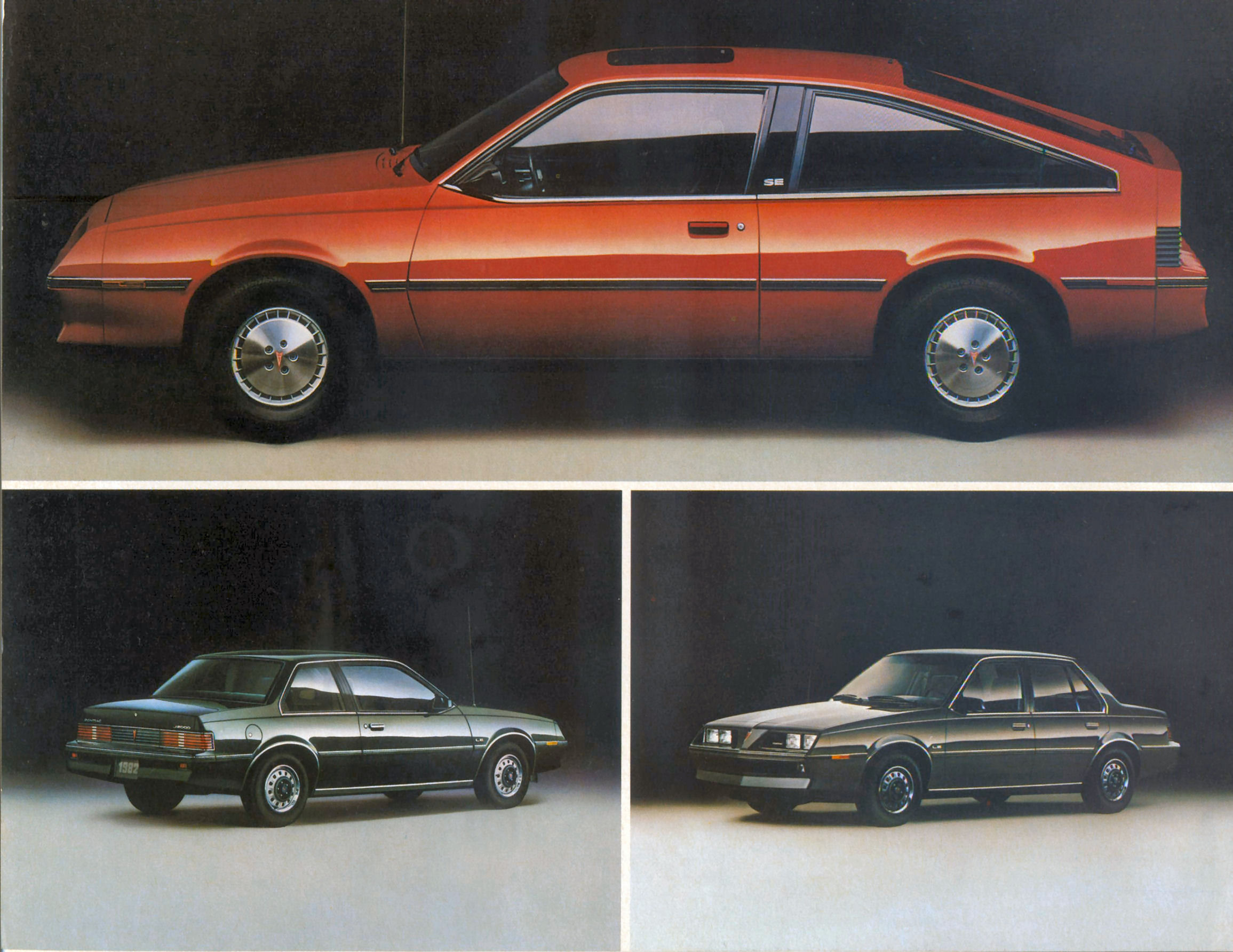
Of course, the 84 horsepower on tap couldn’t match the mini-Trans Am looks; zero to sixty took a dismal 16 seconds with the automatic transmission! Imagine how dull a drag race would be with, say, a Diesel VW Rabbit? Inside, you at least got an available full set of gauges to monitor your overstressed motor, and the upper-level SE models got a “nifty Viscount” interior with “donut hole” headrests and seats from KITT, the Knight Rider.
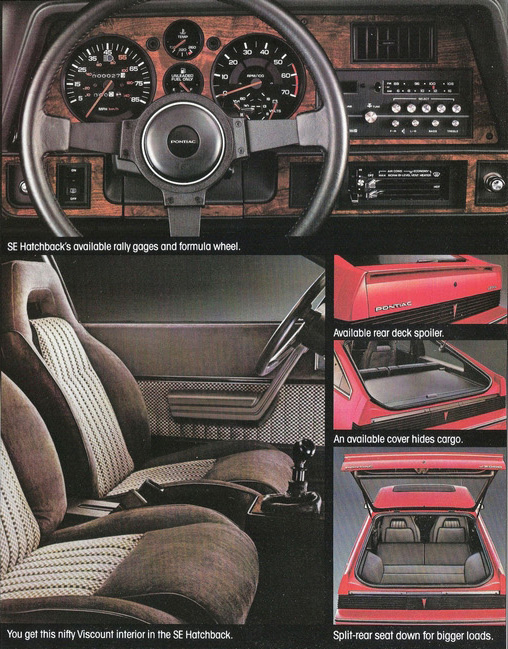
This might have been the malaise era, but that’s no excuse for such lackluster performance figures as those. Thankfully, Pontiac wasn’t content with the situation and implemented improvements like fuel injection and an optional two-liter motor. The rather sterile “J2000” moniker first changed to just “2000” and finally the “2000 Sunbird” in 1984 to give the little J-car a more approachable name.
But the biggest news for ’84 was an optional turbocharged version of the 1.8-liter motor that packed an impressive 150 horsepower. You could get a manual transmission or a three-speed automatic, but the stick shift had a mere four gears (likely the 5-speed on lower-level Sunbirds couldn’t handle the power). To say that this motor transformed the car would be a massive understatement.
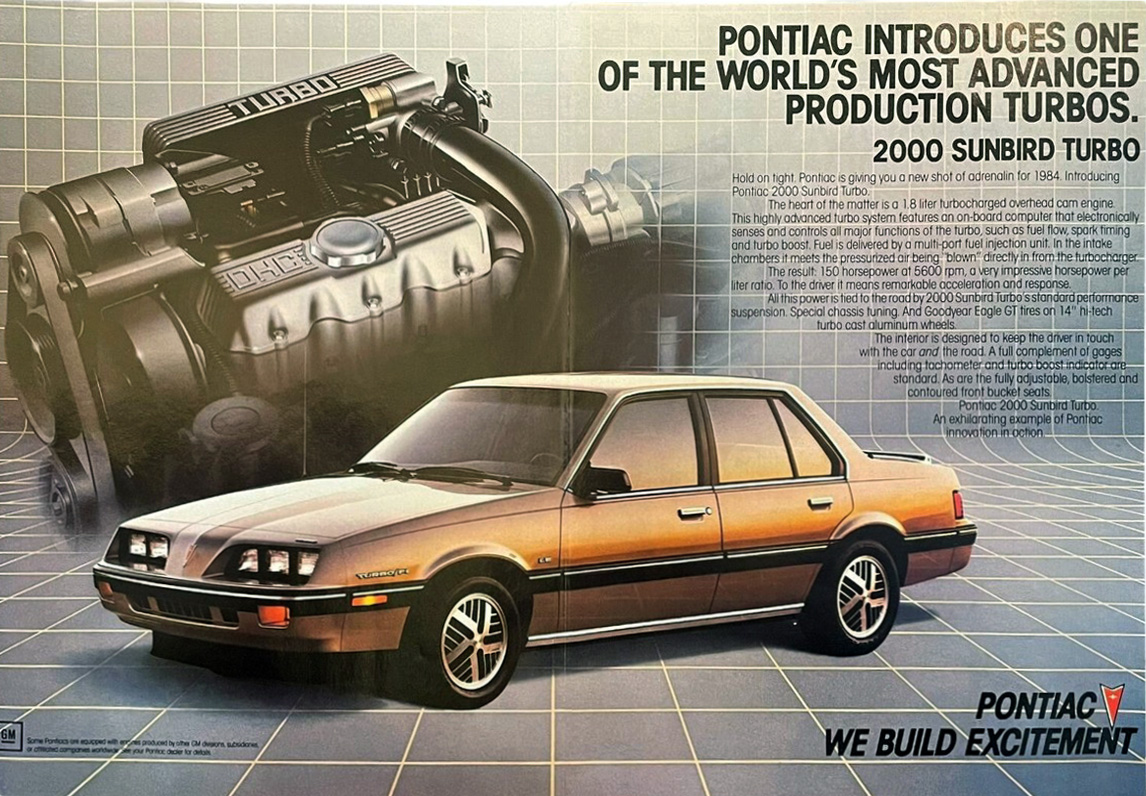
Car and Driver, which in the David E. Davis era had no problems calling a turd a turd, was rather dumbfounded by this thing:
Despite some early praise from us and the best efforts from Pontiac’s copywriters, this car has eluded detection better than late night lovers at the local motel. In fact, it’s the best-kept performance secret in Detroit…The thing no one seems to have noticed yet about the 2000 Sunbird Turbo is that it goes like the dickens..it now owns the kind of speed that can embarrass a lot of today’s hot iron- domestic or imported. Numbers? How about zero to sixty blasts of just 8.3 seconds (with the automatic)?
…you should know that it’s more than just a tire-squealing specialist. This once-lowly J-car now actually has the kind of moves that an enthusiast can relate to on his favorite stretch of country road.
We can’t ignore what John Davis had to say about this new and improved Sunbird, can we?
Those aren’t blistering performance figures for today, but it’s tough to think of many cars out there where within two years of their launch, the maker was able to nearly double its horsepower and cut zero to sixty acceleration times almost in half.
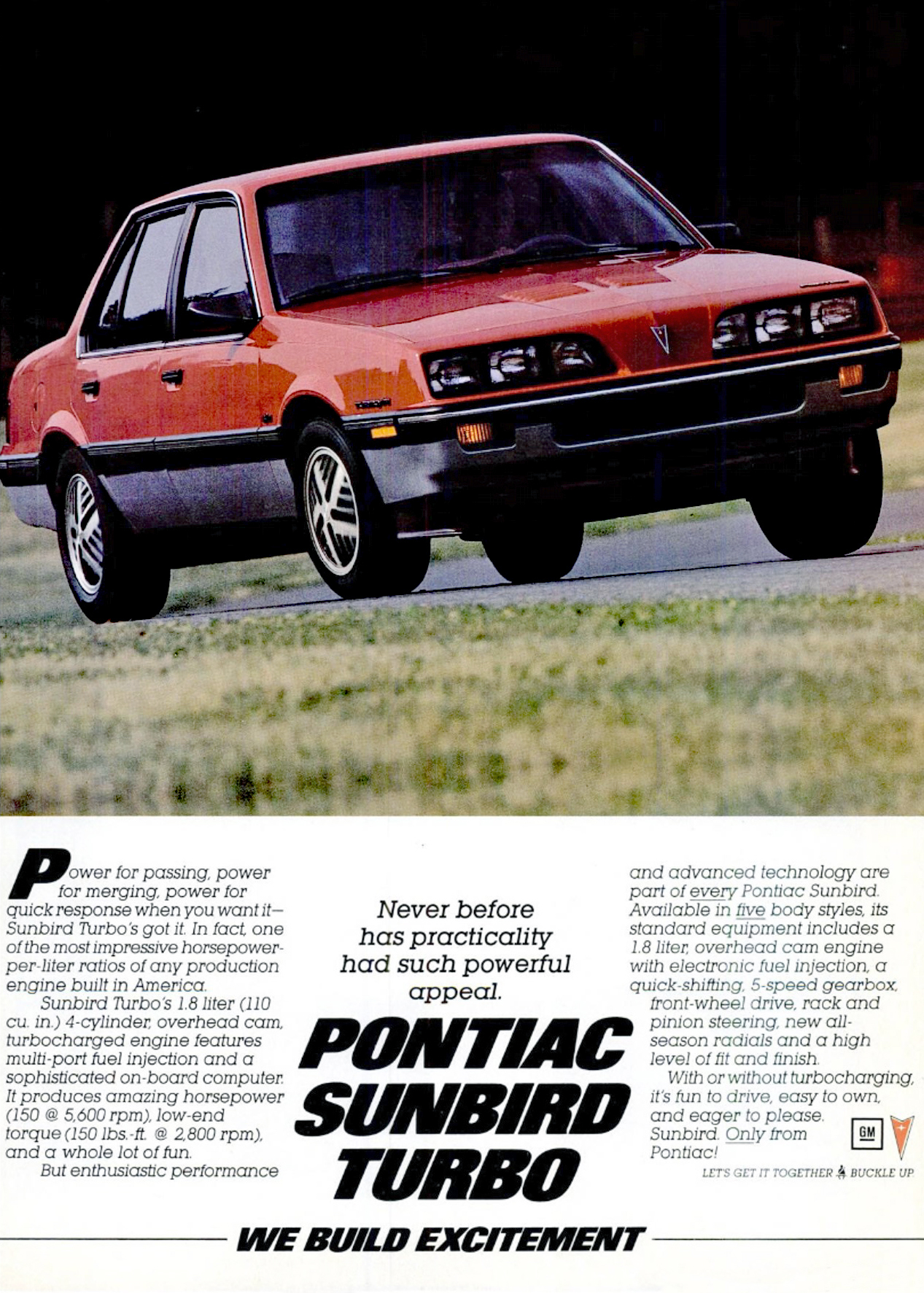
You could apparently get the turbo engine in any 2000 Sunbird, but the S/E model had it as standard (I get conflicting information on whether or not you could have a Turbo wagon, but most sources say no). The S/E’s mandatory WS6 performance suspension was matched with 14-inch Goodyear Eagles on alloys. Also, you can see that the S/E has the integral fog lights in the nose, giving it effectively six headlights and upstaging the headlamp count of any other subcompact.
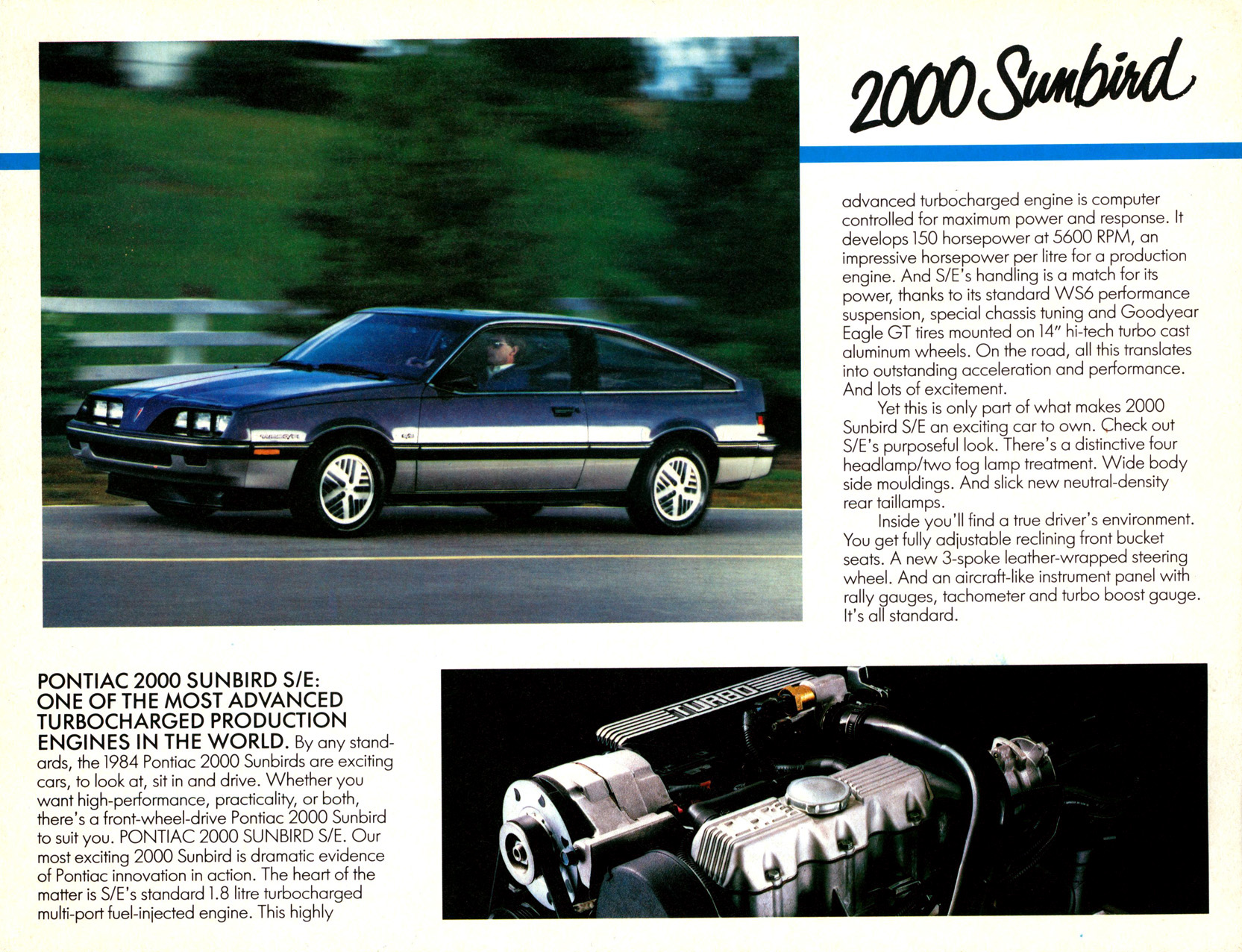
Pretty impressive for 1980s GM. How do you top a subcompact coupe that was capable of beating many contemporary pony cars and had six freaking headlights? In Pontiac’s case, you give it more power. For 1986, the Sunbird added a new GT model with the 1.8-liter turbo motor bored out to two full liters and making a total of 165 horsepower, pumping through the same four-on-the-floor or three-speed slushbox. Also part of the GT package were fender flares (even though the tires were no wider than the ones available on some lesser models) and a sinister-looking “squinty” front end with electric pop-up lids over the headlights.
Inside, you get a great sampling of 1980s General Motors cockpit design with things like exposed screws and optional power windows featuring switches perched in very plastered-on boxes.
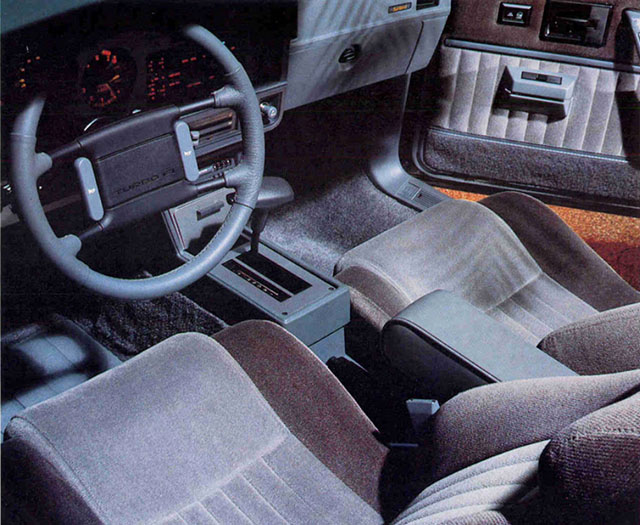
But what about performance? That extra fifteen horsepower doesn’t seem like much today, but in a lightweight malaise-era car, it was enough to push the zero to sixty time of the Sunbird GT Turbo down to the very low seven-second range with the stick. Yep, this little J-car could have possibly shown its new smoked-out “grid” taillights to the likes of a Mustang GT.
The GT Turbo was not available as a station wagon, but besides the two-door notch- and hatchback coupe, there was a GT Turbo four-door on offer, likely making it the fastest compact or sub-compact sedan money could buy in the years it was available. A blower-equipped GT convertible was also on the books, but these uncommon body styles of this sleeper fell under the radar. Based on the sales figures I could find, only 2,802 sedans found buyers, along with a mere 1,268 convertibles.
A word of note: the Sunbird’s Buick cousin, the Skyhawk, was also available with the turbo motor from ’84 to ’87, but only in 2-door T-Type form. I don’t have production figures, but that has to be a rare bird indeed.

If this GT Turbo sounds like something that would make VW and Honda just stop sending boats full of hot hatches here to the US, you might have to think again. See, General Motors used to be an expert in getting dreaded torque steer even in 60-horsepower cars. You can imagine that nailing the gas pedal in a 165-horsepower car with the same different-length front half shafts as run-of-the-mill J-cars would have you yanking the wheel to keep your Sunbird out of the gutter or the other lane. Oh, but it gets worse: do you need to know what “turbo lag” is? This Sunbird would illustrate that affliction readily to you. There was a standard turbo boost gauge, but you didn’t need it: you knew when it kicked in. Basically, under acceleration, you’d get next to nothing until BOOM the whole powerplant would just explode with power and forward motion, at the same throwing the car dramatically off course. Yeow!
I’m not going to beat a dead horse and start talking about GM’s assembly and materials quality standards of the eighties; the trim pieces that fall off, the cloth seat fabric that looks like the stuff at a Build-A-Bear workshop, and doesn’t come close to matching the color of the dashboard. It’s so well known and documented that it’s not even worth getting into at this point.
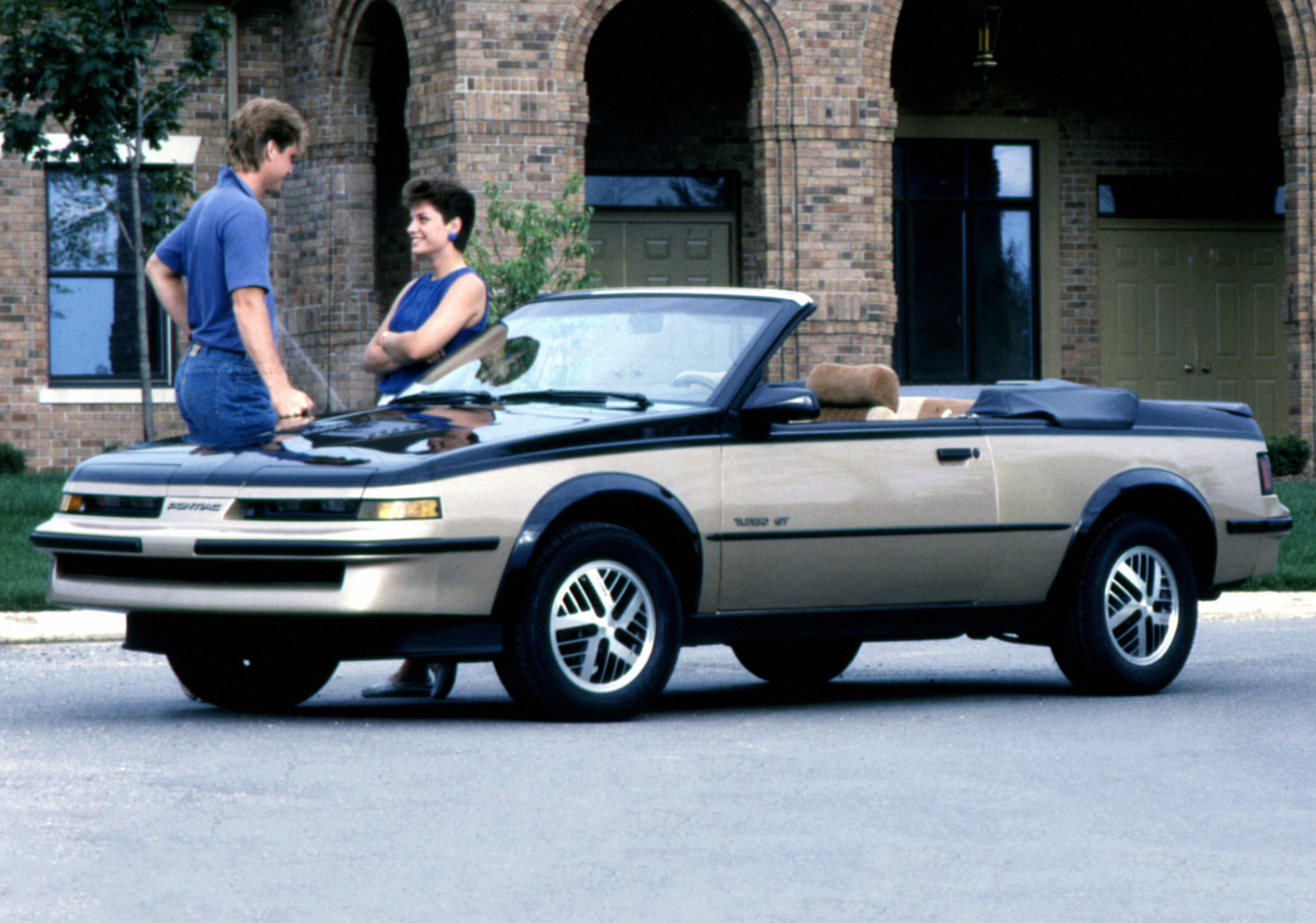
I’m sure that the steering wheel in that Turbo convertible above will bounce up and down with the lack of structural integrity from sawing off the roof. You know what? Who cares! Going into a Schwarzenegger movie in the eighties, were you expecting an Oscar-winning epic? No, you wanted big, loud, stupid fun. Hopping into a turbocharged Pontiac J-Body is certainly the automotive equivalent of that.
The Sunbird GT for 1988 ditched the sedan plus the hatchback and added a sharply raked backlight to the coupe, but the mighty turbo stuck around through 1990 when it was supplanted by a bigger, heavier, and less powerful V6. No versions of the later Sunfire and G5 models that replaced the J-body subcompact ever approached the acceleration high-water mark set by the Sunbird GT Turbo, the subcompact that made a ’64 GTO smile down from heaven.
Let’s Go Embarrass That Dude With The Base Model Z28
Starting out as the relatively rare cars that were, by nature, throwaway vehicles means that a Sunbird GT Turbo in any condition whatsoever will be tough to find today. The question really is, if you did happen upon one, would it be worth taking a look? Well, if you’re a VW Jetta GLI or Civic Si person, forget it. Comparing those European and Japanese cars to this boosted Sunbird would be like pitting a Datsun 280Z or Porsche 924 against a Trans Am; they’re cheese and chalk, as the British might say. You want some flashiness with your subcompact? Got it in spades. You want to get from Point A to Point B the quickest, don’t care how refined the ride that gets you there is? You can’t beat the Sunbird GT Turbo.
More importantly, the obvious flaws don’t mean that people haven’t owned and loved their J-cars for long periods of time; the statement that “GM car’s run badly longer than most cars run at all” could easily apply to the Sunbird.
Find your old Members Only jacket, pop Duran Duran’s Rio into the cassette deck, punch the gas, and WHOOOA which way are we going? This Sunbird will certainly live up to Pontiac’s promise of “excitement”, even if that excitement might occasionally be in ways that you didn’t bargain on.
Pontiac Points: 75/ 100
Verdict: Who needs build quality when you have pop-up headlight covers and a better power-to-weight ratio than a Trans Am?

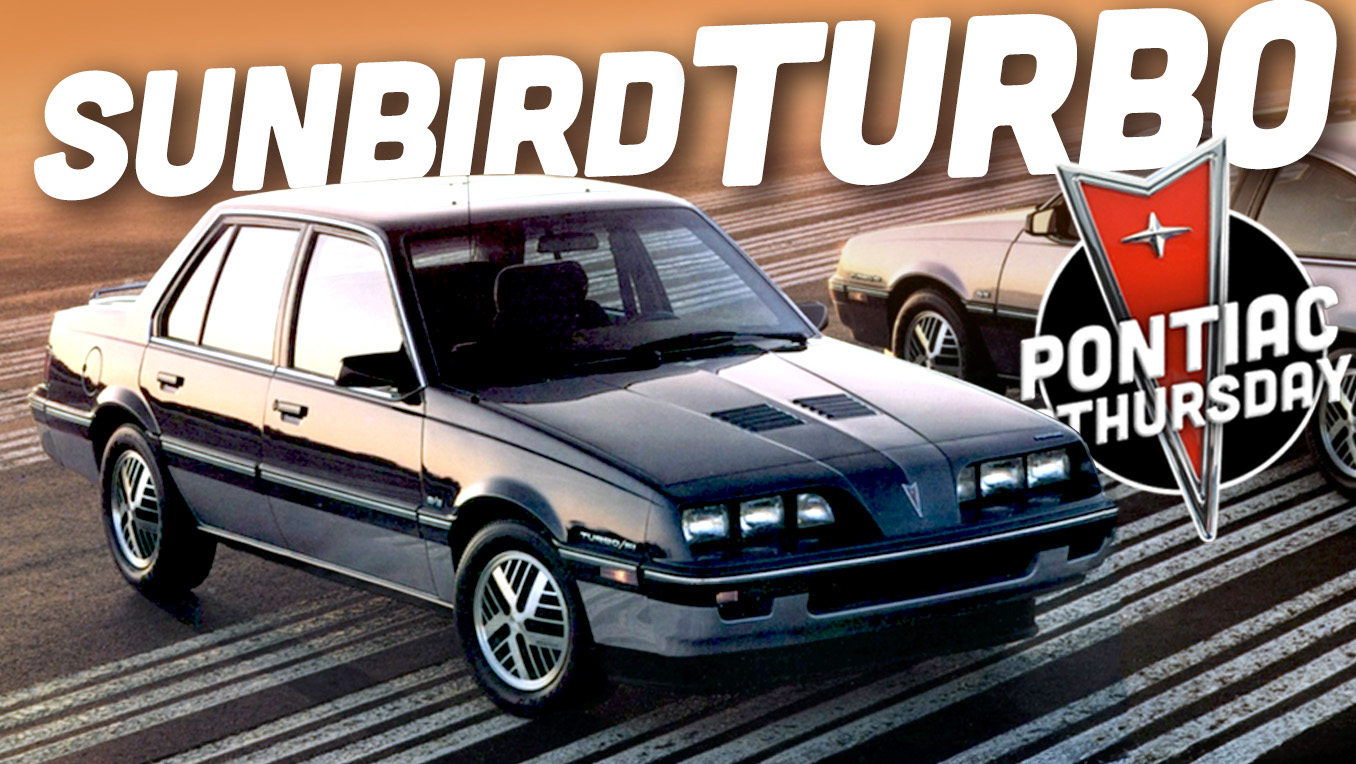
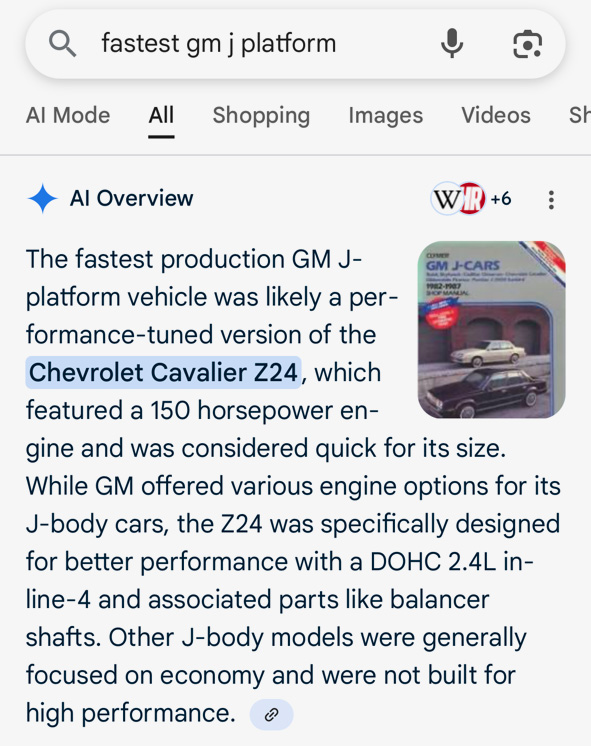
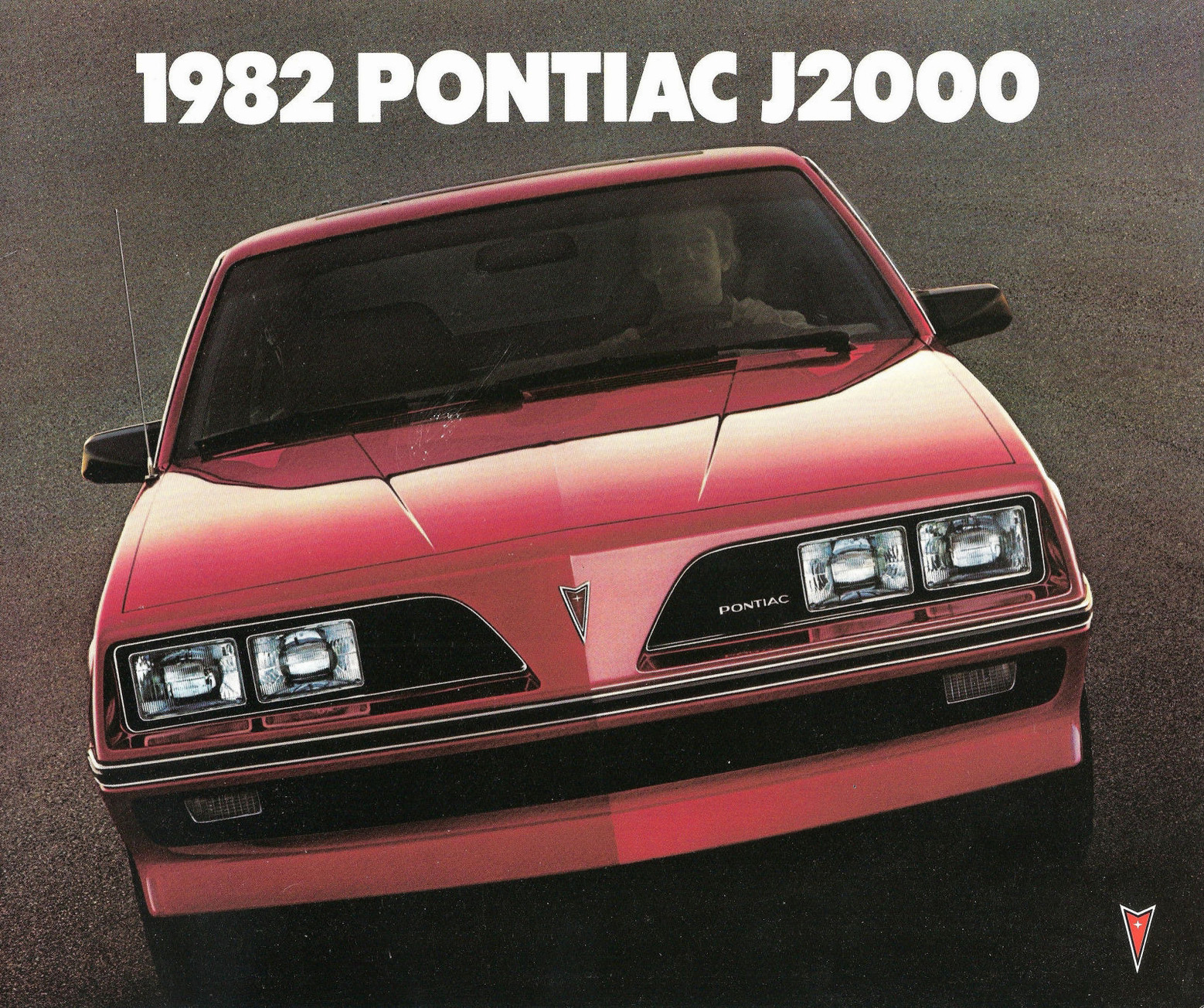
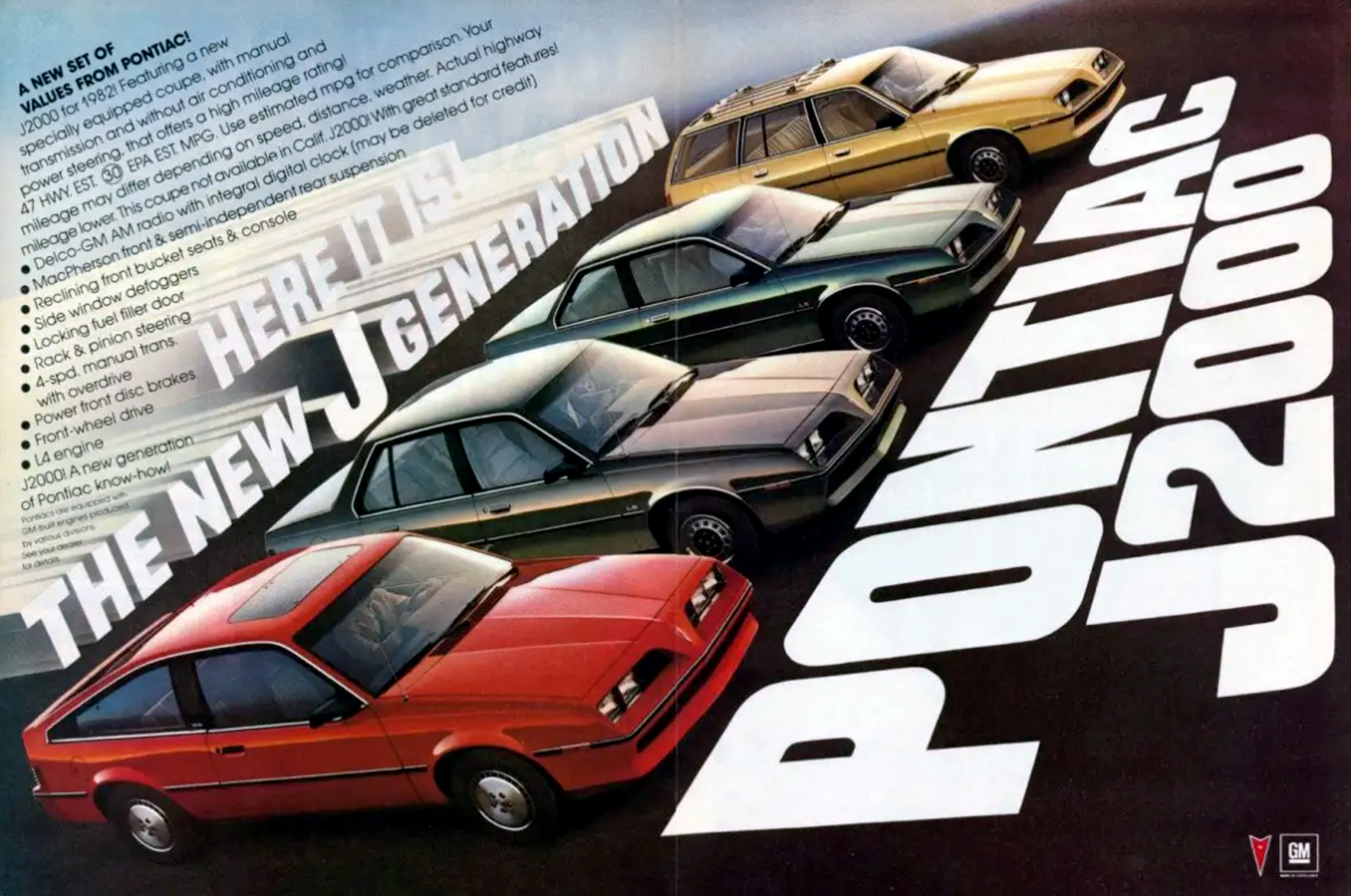
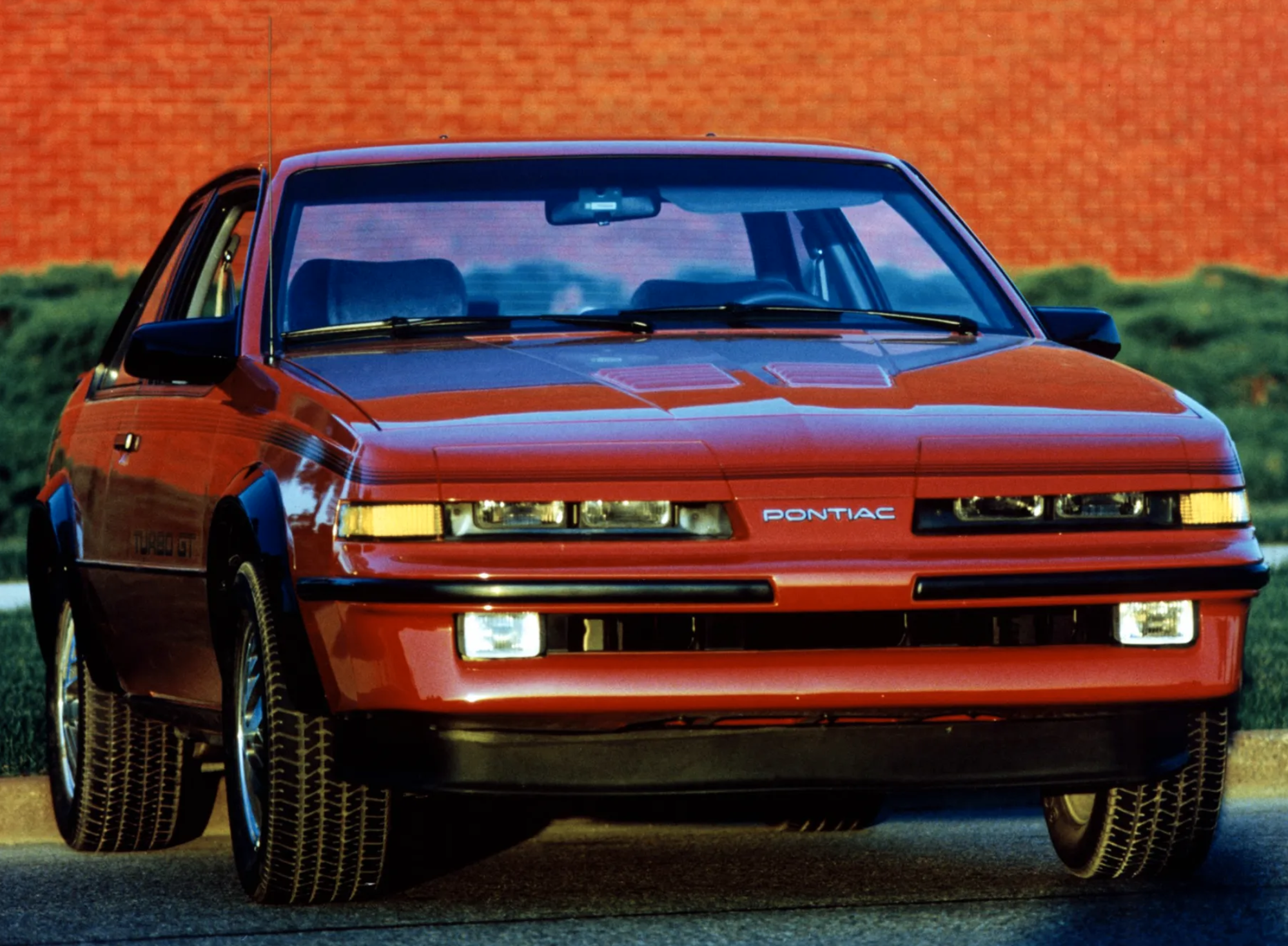




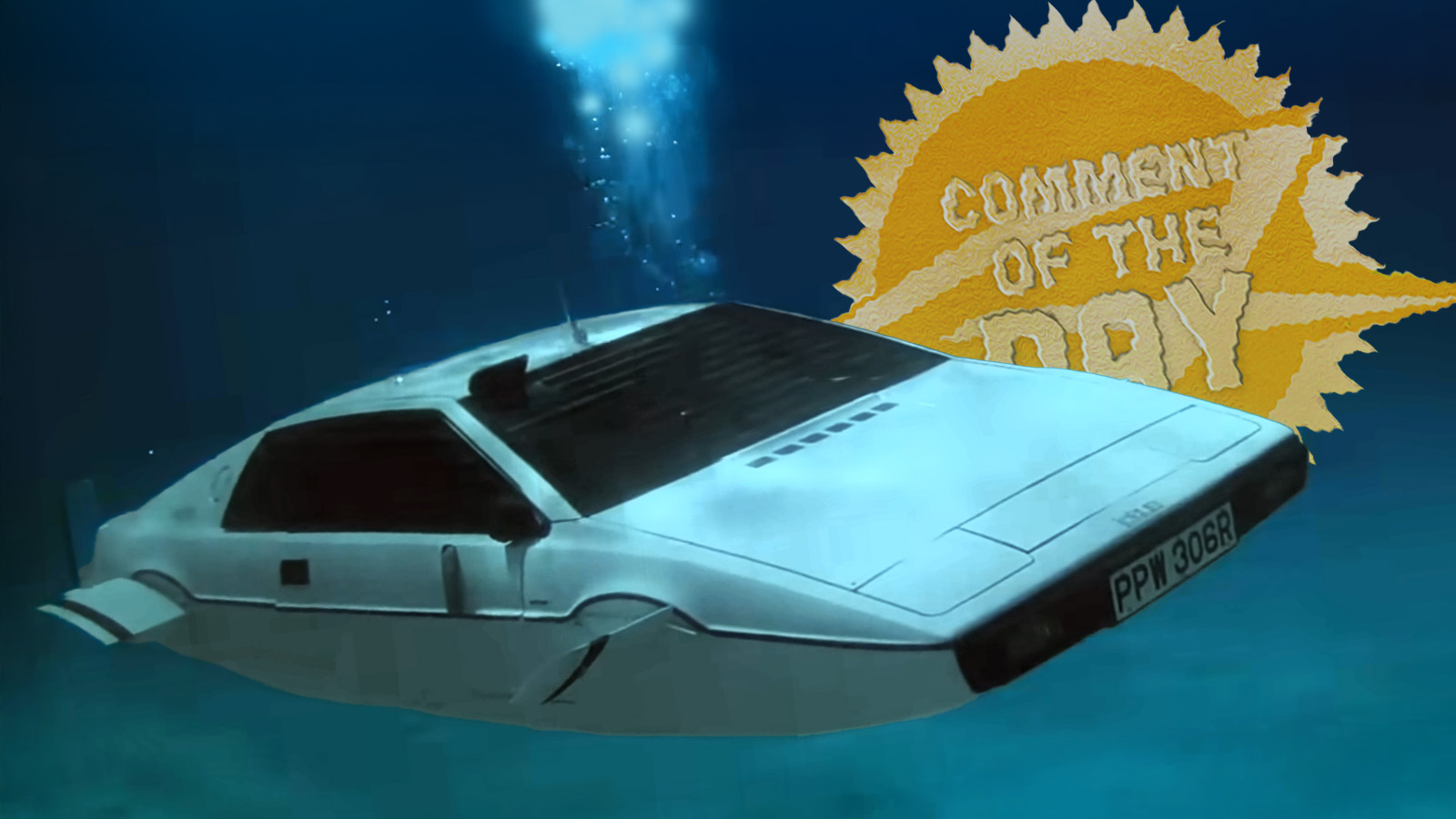


Very well-written, entertaining, and informative piece!